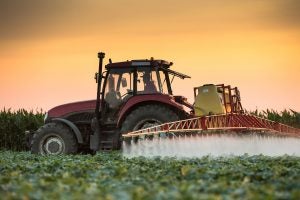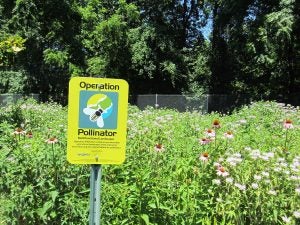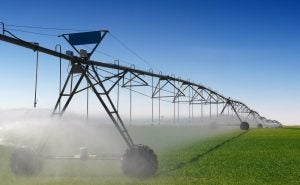Modern agriculture practices have been in the hot seat for years, and it’s no wonder why. With a growing global population of over 8 billion people and the pressure to feed everyone in a way that’s sustainable for the planet, consumers are becoming increasingly more interested in how their food is being produced.
Thankfully, farmers and ranchers have been at the forefront of implementing technologies aimed at ensuring each acre and animal is grown responsibly and sustainably. However, not everyone recognizes the innovations being made as beneficial, and many more twist the facts to spread fear and misinformation surrounding modern ag.
Here are 10 common myths about agriculture, debunked.
Myth 1: Modern agriculture uses way too many chemicals and pesticides.
While it’s true that pesticides and fertilizers are necessary in moderation to help efficiently and healthfully produce the large, blemish-free produce sold at the grocery store, they’re not the be-all and end-all. Today’s farmers are constantly striving to find the most sustainable production methods that protect soil and human health.
Integrated Pest Management (IPM) techniques and precision farming help reduce chemical usage, protect native wildlife, and promote healthier ecosystems. Without any of these live-saving substances that protect the crop from insects and disease, you could kiss your “perfect” produce goodbye.

Myth 2: Genetically Modified Organisms (GMOs) are dangerous.
GMOs have sometimes been given a bad rap, but they’re not the villains they’re made out to be. Scientists have spent years meticulously researching and developing GMOs to enhance crop resilience, increase yields, and even improve nutritional content. Numerous studies have shown that GMOs are safe for consumption and can be an essential tool in feeding a growing population.
One of these investigations includes an extensive analysis conducted by the National Academies of Sciences, Engineering, and Medicine. This review examined over 900 publications and two decades’ worth of data to find “no substantiated evidence of a difference in risks to human health between current commercially available genetically engineered (GE) crops and conventionally bred crops.” While your concern for your children’s health is admired, rest assured that foods containing GM ingredients are perfectly safe for your family and beneficial for the planet.
Myth 3: Organic farming is always better than conventional farming.
Organic farming is popular among diet fads, food-secure communities, and the health-conscious, but it’s not the only way to produce nutritious and sustainable food. Conventional farming practices have advanced markedly, embracing technological innovations to minimize environmental impact and increase efficiency.
It’s important to note that organic farming does not equal a lack of chemical pesticides. While these more “natural” pesticides may or may not be less potent than their synthetic counterparts, that doesn’t also mean they are any less dangerous for the environment. In fact, one study published by the University of California, Berkeley found that up to seven applications of the organic pesticide were required to obtain the level of protection provided by just two applications of the synthetic, which plays a major factor in fuel and machinery usage as well as runoff potential.
Both organic and conventional farming have their pros and cons, and it’s essential to consider the context and specific needs of each situation (it’s not uncommon for farmers to grow a both organic and conventional crops across the fields on which they operate).

Myth 4: Factory farms are inhumane and cruel to animals.
First of all, let’s ask ourselves what is a factory farm? To be sure, most farms do have similar goals to that of a factory. Farmers want to produce high-quality, consistent products for their consumers. This, however, doesn’t mean that farmers don’t care about their operations.
While animal rights groups have taken advantage of spotlighting isolated cases of animal mistreatment in the past, modern agriculture as a whole is working hard to prioritize animal welfare. State and federal welfare regulations, animal health programs, and advancements in housing systems ensure that farm animals receive proper care, exceptional nutrition, and suitable living conditions. Some farms even go the extra mile in providing enriching toys for their animals such as brushes that hit the spot when a dairy cow gets an itch!
Myth 5: Large-scale agriculture destroys biodiversity.
Not quite! Modern agriculture recognizes the importance of biodiversity and actively implements practices to protect it. Many farmers adopt measures like crop rotation, intercropping, and buffer zones to support wildlife habitats and preserve natural ecosystems. And major ag companies do a lot to support pollinator initiatives.
It’s all about striking a balance between efficient production and conservation.

Myth 6: Modern agriculture is largely responsible for climate change.
While agriculture does contribute to greenhouse gas emissions, it’s certainly not the only sector to blame. Through innovative practices like precision farming, reduced tillage, and methane capture, farmers are playing their part in mitigating climate change. In fact, agriculture is one of the only sectors that has the capability to achieve net-zero or even net-negative emissions due to its unique ability to sequester large amounts of carbon in plant tissues and soil.
The biogenic cycle of ruminants also demonstrates the vital difference between emissions produced by animal agriculture versus other industrial sectors, including their impact on the atmosphere. Regardless, reducing global warming caused by climate change is a collective effort involving multiple industries to make a significant impact.
Myth 7: Farmers waste a lot of water.
Efficient water management is a priority for modern agriculture. Farmers implement advanced irrigation systems — such as drip irrigation and precision sprinklers — to minimize water usage. On dairy farms, most operations recycle the water three to five times before nutrient-rich wastewater is finally used to irrigate surrounding fields. These water recycling and conservation practices help ensure responsible water stewardship on the farm.

Myth 8: Modern agriculture only benefits large corporations.
Modern agriculture benefits farmers of all sizes. Technological advancements and information sharing empower small-scale farmers to optimize their operations, reduce costs, and access global markets. Moreover, innovations like vertical farming and hydroponics enable urban communities to grow fresh produce locally.
Myth 9: Pesticide residues in food are harmful.
Not the full story! While it’s true that pesticide residues may be present in trace amounts on some produce, regulatory bodies like the Environmental Protection Agency enforce strict limits to ensure consumer safety. The residues found on our food are well below the levels that could pose health risks.
Any residue, coupled with physical (dirt, debris) and microbial contaminants that can be found on food products, means that washing fruits and veggies before consumption is a good practice, regardless of the farming method!

Myth 10: Modern agriculture isn’t sustainable.
Modern agriculture is continually evolving to address sustainability challenges. From precision farming to renewable energy integration, the industry is actively seeking innovative solutions. Practices such as cover cropping, soil conservation, and responsible nutrient management help safeguard the environment and pave the way for a more sustainable future.
Well, folks, there you have it! It’s crucial to base our understanding of agriculture on facts rather than misconceptions spread by anyone other than a farmer or rancher. As we move forward, let’s appreciate the hard work our farmers commit to on a daily basis and support their efforts to feed the world sustainably. No matter the method, farms of all shapes and sizes are capable of producing safe, nutritious food for you and your family.
Michelle Miller, the “Farm Babe,” is an internationally recognized keynote speaker, writer, and social media influencer and travels full time to advocate for agriculture. She comes from an Iowa-based row crop and livestock farming background and now resides on a timber farm in North Central Florida.



